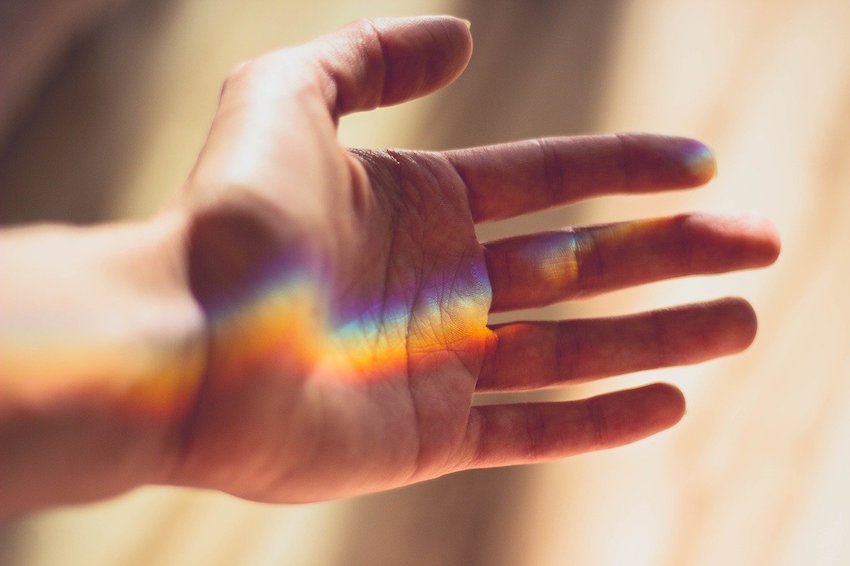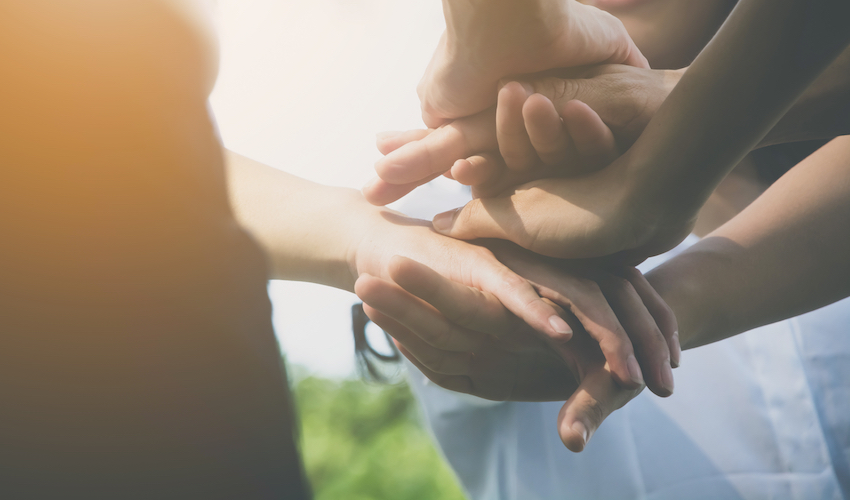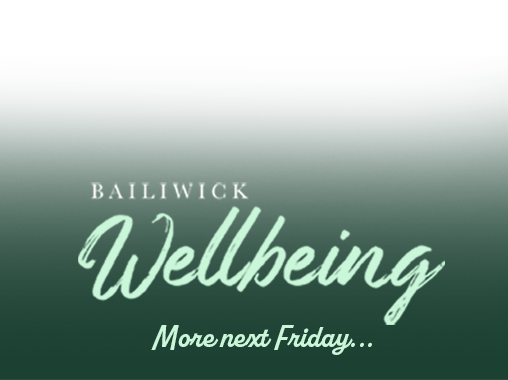


From releasing feelgood hormones, to reducing anxiety and supporting your immune system and sleep... A new book co-written by a local author explores the "transforming power" of kindness for both those who give it and receive it.
Cathy Le Feuvre has teamed up with her friend of 20 years, and former neighbour, Debbie Duncan, to write ‘The Gift of Kindness: The Transforming Power of Being Kind’.
Many islanders will remember Cathy (pictured top, right) as BBC Radio Jersey’s former Sunday Breakfast and Afternoon Show presenter, while Debbie (pictured top, left) was a nurse and midwife in the NHS for over 30 years, and is now a lecturer in nursing at Queen’s University in Belfast.
Having both written books on their own, and eight years after penning ‘Life Lines: Two Friends Sharing Laughter, Challenges and Cupcakes’ together, the pair chose to focus on kindness and its benefits for their new project, inspired by the many random acts of kindness they witnessed around them during the pandemic.
Mixing real life stories from Jersey and further afield with scientific, anthropological and biblical insights, ‘The Gift of Kindness’ aims to convince everyone of the benefits of kindness and how it can transform us and others.
Express spoke to them about what they learnt about the transformative power of being kind...

Pictured: 'The Gift of Kindness' was published in September 2022.
Both of Christian faith, Cathy and Debbie had both “experienced kindness in their own lives and knew the power of it personally” before they started working on their book.
“People have been extraordinarily kind to both Cathy and I in amazing ways,” Debbie said.
“Their acts have changed our lives. I also believe that kindness can change individual lives and the communities we live in. Cathy shares many stories of this in the book.”
“Kindness, as we discovered in our research, is part of the human condition,” the pair said. “We are all born, we think, with the ability to be kind and often it is circumstances and culture and conditioning which helps us to promote that in our lives, or not. However, during the pandemic, it seemed that the world suddenly decided to focus on kindness. This is what Debbie had certainly felt and observed, which had given her reason for deep thought on the subject, and which motivated the book."

Pictured: "During the pandemic, it seemed that the world suddenly decided to focus on kindness."
“Surrounded as we were in 2020 and 2021, when we began to write the book, by all kinds of challenges relating to the coronavirus pandemic, lockdowns and restrictions, we were aware of the wonderful kindnesses that were being shared not just in our own communities, Jersey and Northern Ireland, but also across the UK, and the wider world. It was inspiring and we certainly thought it was worth documenting what felt like an unprecedented moment in human history when kindness was outpoured so wonderfully.”

Pictured: Being kind or receiving kindness releases hormones into our system.
"We all know that when someone is kind to us it makes us feel better – it helps with our general wellbeing – and being kind to another person can also raise our spirits. Both being kind and receiving kindness has a positive benefit in our lives.
There is actually some science behind all this.
Being kind or receiving kindness releases hormones into our system:
Other physical benefits include supporting your immune system, reducing anxiety, supporting sleep, reducing the risk of cardiovascular disease and of Type 2 diabetes. The list is endless!

Pictured: "If we receive a kindness from someone, we are more likely to respond with kindness."
Kindness, we discovered as we wrote the book, is also ‘contagious’.
If we receive a kindness from someone, we are more likely to respond with kindness, either by being kind to the person who was kind to us, or to someone else. Kindness by example is important because we concluded that if we work at being kind, we can ‘transform’ our relationships, our communities and even our world."
"In the book we look at the popular theme which many businesses and individuals now promote, the idea of ‘Paying in Forward’.
It was first conceived in the coffee stalls of Naples in Italy, where people who could afford it would not only buy their drink but also a second cuppa for someone who might come along later and who, perhaps, could not afford to buy. This ‘Pay it Forward’ culture is now worldwide and is embedded in some businesses and has received acknowledgement though literature and movies.

Pictured: "It was first conceived in the coffee stalls of Naples in Italy, where people who could afford it would not only buy their drink but also a second cuppa for someone who might come along later and who, perhaps, could not afford to buy."
It’s something that people across the globe benefit from every day, receiving a ‘free’ drink or meal, or bowl of soup, like the daily soup available at The Salvation Army café hub in St. Helier, partly thanks to the kindness of another, unknown benefactor.
Being kind without wanting any reward in return is certainly something that can increase our sense of wellbeing, as we know we are helping someone unconditionally and without any strings attached. Although that quiet sharing of kindness may feel counter-cultural in these days of social media, which often may be all about drawing attention to ourselves, and in a time when we are all encouraged to put ourselves first, we reckon that it’s all the more powerful BECAUSE those kindnesses are shared altruistically.
None of us know how another person’s life is unfolding and we know that not everyone feels good all the time. Being kind to another person may, without our knowing it, make their day and raise their spirits at a difficult time. We don’t need to know about their circumstances but knowing that we might have helped them is a way of improving their sense of self-worth and wellbeing and may have a similar impact on our own wellbeing."

Pictured: "Kindness is seen as an important topic in psychology, science and the social sciences."
"The book is peppered with examples of current research in this field. There are research articles, journals and whole textbooks dedicated to the topic. Kindness is seen as an important topic in psychology, science and the social sciences.
One of the pieces of research we looked at was a workplace study into the impact of kindness in the workplace. In Madrid, workers at a Coca Cola plant were unknowingly split into three groups, those who were tasked with doing at least one simple act of kindness a day, those who would receive those kindnesses, and a control group.
This revealed some fascinating results which proved that people who give and receive kindnesses, even simple acts of kindness like being offered a drink, or being smiled at, are more likely to feel better about the workplace and to live out kindness not just at work but beyond. And this wasn’t a short-term phenomenon, the kindness spread! Being kind at work? It’s just one of the challenges of kindness!"
"One of the purposes of ‘The Gift of Kindness’ is to help us all to develop that spirit of kindness in our lives.
We think we all have the gift of kindness within us. We need to exercise it like a muscle – intentionally being kind. This can be a small step like saying, “hello” to someone we don’t know. We need to help kindness grow in our lives.

Pictured: "Keep a kindness journal."
Here are a few other ideas to get you started…
Although one aim is to help us all become kinder by nature, with kindness being as natural as breathing in and out, one practical thing we may wish to do to help us develop kindness in our lives is to DELIBERATELY do something kind for someone else every day.
Keep a kindness journal: an everyday note of how someone was kind to us, or how we tried to be kind to others and the response we received.
Try to avoid being critical and cynical, which is often the opposite to kindness.
Being less judgmental and developing more patience. Unkindness often results from impatience. Let’s all just try to breathe a little more before making a judgement, jumping to conclusions about other people’s behaviour and offering our thoughts on something that, perhaps, is not our business."

Some simple advice...
• Smile more: it lifts our spirits and certainly can make another person's day brighter.
• Listen: it helps us be kinder because it helps us understand why someone might be behaving in a certain way. Taking time to listen to another person's story is a kind thing to do.
• Be kind to yourself: it is said that it's hard to be kind to someone else if you have a low opinion of yourself or feel that you are not worthy of kindness. Mental wellbeing is as important as physical wellbeing and learning to love ourselves, giving ourselves time to work through our own issues and challenges, is vital. That might sometimes mean putting our own needs before others, giving ourselves space and working on our own health and wellbeing. That's something that we can do every day.
• Acts of Kindness: try to do something kind for someone every day. That doesn't have to be grand – you don't have to donate masses of money to charity or do big grand gestures for all the world to see. How about simple things like...
It's down to you really, we believe the more kind things we do, the more we'll be inclined to be kind."
This article first featured on Bailiwick Wellbeing, your free weekly guide to wellness in work and island life. Sign up now here.

Comments
Comments on this story express the views of the commentator only, not Bailiwick Publishing. We are unable to guarantee the accuracy of any of those comments.